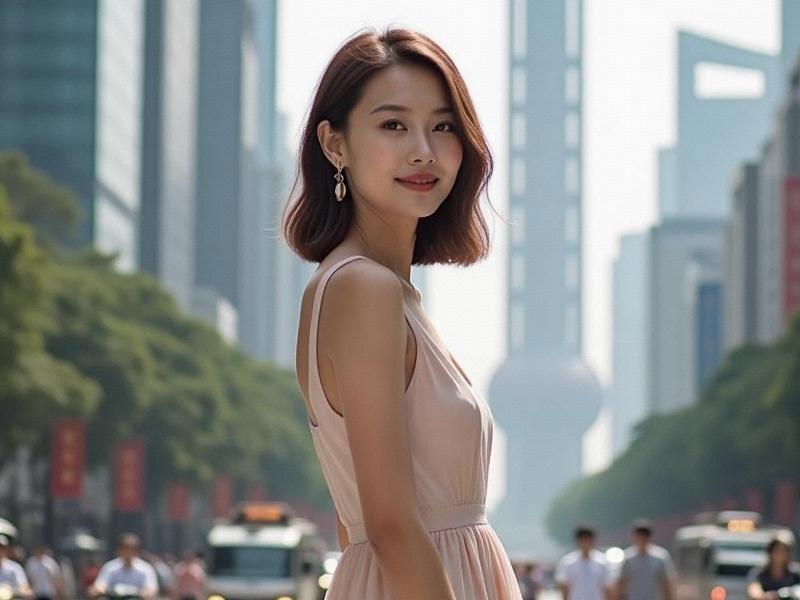This in-depth feature examines how Shanghai's women are redefining Chinese femininity through a unique blend of traditional values and progressive ambitions, creating a new archetype for Asian urban women.

[The Shanghai Phenomenon]
At 8:15 AM in the Jing'an Temple metro station, a fascinating cross-section of Shanghai womanhood rushes by - tech executives in tailored qipao dresses scrolling through stock updates, grandmothers practicing sword dance routines before coffee meetings, and Gen-Z artists carrying both sketchbooks and VR headsets. This is Shanghai's feminine mystique: a cultural alchemy that's produced China's most distinctive urban female identity.
[Historical Foundations]
Three generations shaping Shanghai femininity:
1) The "Jiangnan Gentlewoman" (Pre-1949)
- Influenced by Jiangnan region's educated elite
- Emphasis on refined arts and domestic skills
- Pioneering female entrepreneurs like Dong Zhujun
2) The "Iron Flower" Generation (1950-1990)
- Socialist equality creating female factory leaders
- Balancing revolutionary zeal with femininity
- Development of practical yet stylish "Shanghai style"
3) The "Hybrid Phoenix" (1991-Present)
- Global exposure meets local traditions
- Highest female workforce participation in China (72%)
- New definitions of success and beauty
[Economic Powerhouses]
上海龙凤419手机 Shanghai's female professional landscape:
- 38% of tech startups have female founders
- Women control 65% of household investments
- 28% of C-suite positions in multinationals
- 140% growth in female angel investors since 2020
[Fashion as Identity]
Evolution of Shanghai style:
1) "Modern Qipao" Movement
- Traditional dresses with tech integrations
- LED embroidery and temperature-sensitive fabrics
- Worn by professionals as power dressing
2) The "Meeting Point" Aesthetic
- East-West fusion outfits
- Luxury brands with local tailoring
- Rise of Chinese designer labels
3) Subculture Expressions
- Hanfu revival among young professionals
- Avant-garde streetwear collectives
爱上海419论坛 - Sustainable fashion pioneers
[Cultural Paradoxes]
Unique Shanghai feminine traits:
- 89% value both career and family equally
- Highest average marriage age in China (30.4)
- 62% prefer "partnership marriage" model
- Strong filial piety despite independence
[Education Revolution]
Female academic achievements:
- 57% of STEM graduates are women
- 3:2 female-to-male ratio in humanities PhDs
- 140% increase in women studying abroad since 2010
- "Second Degree" trend at age 35+
[Challenges and Progress]
Gender landscape developments:
- 24% pay gap (versus 34% national average)
- Improved maternity leave policies
- Growing anti-harassment protections
爱上海 - 68% report feeling "mostly equal" professionally
[The Future Shanghai Woman]
Emerging trends:
1) "Whole Life Learning" Philosophy
- Continuous education at all ages
- Multi-career life paths
- Tech literacy as priority
2) Redefined Beauty Standards
- Rejection of extreme thinness
- "Healthy glow" aesthetic
- Anti-aging to pro-aging shift
3) Spiritual Capitalism
- Combining business success with mindfulness
- Philanthropy as status marker
- Environmental consciousness
[Conclusion: The Shanghai Blueprint]
As dusk falls on the Huangpu River, the lights illuminate a city where women navigate skyscrapers and silk markets with equal grace. Shanghai's feminine ideal isn't about choosing between tradition and progress - it's about rewriting the rules entirely. In these streets where jasmine tea aromas mix with blockchain buzzwords, a new global model of urban womanhood is being coded, one that maintains cultural roots while reaching unprecedented heights.
"Shanghai women don't break glass ceilings," observes sociologist Dr. Wen Zhao. "They redesign the entire building while wearing heels and making sure everyone gets promoted together. That's the real lesson for gender progress worldwide."